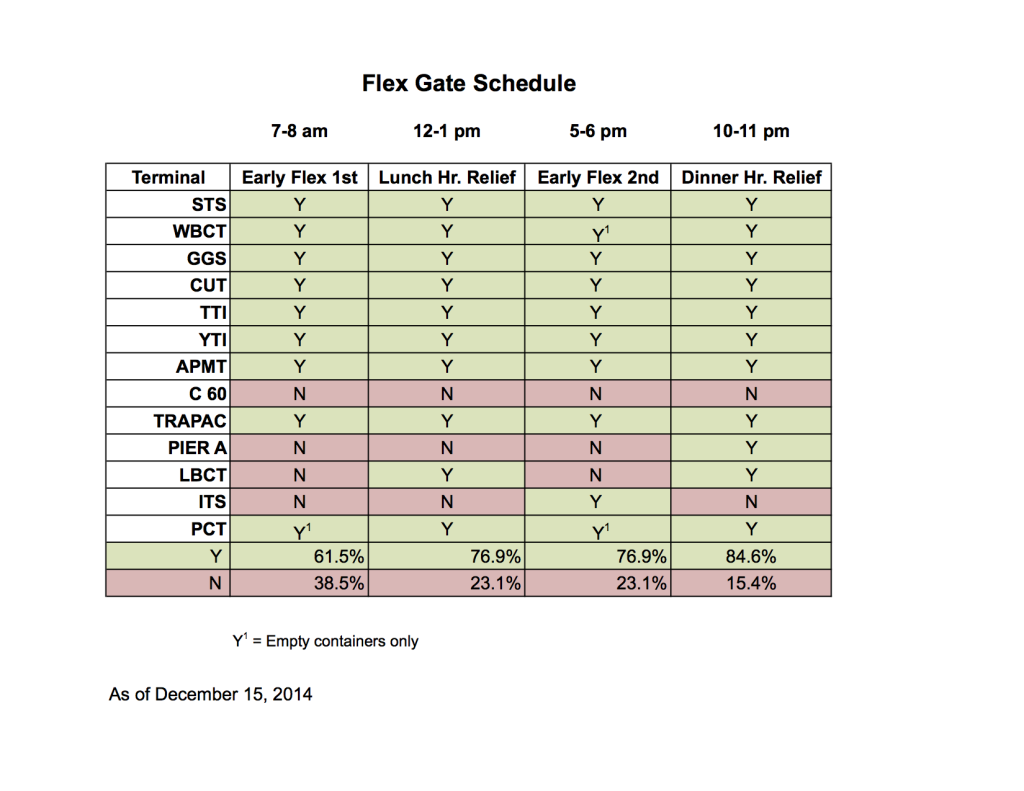PierPass President John Cushing on Friday published the following op-ed in the Journal of Commerce. The original article is available here.
Counting on Common Sense to Tackle Port Congestion
John Cushing, President of PierPass Inc. | Nov 07, 2014 12:03PM EST
The Ports of Los Angeles and Long Beach are experiencing the most serious congestion in years. While a broad range of factors have contributed to the situation, there is widespread agreement in the industry that the largest single problem right now is a shortage of available chassis. That problem and related ones are the focus of intensive activity by the ports, the terminal operators and other stakeholders in the supply chain.
Meanwhile, the largest single solution to congestion over the past decade has been the OffPeak Program run by PierPass, which essentially doubled the capacity of the two ports by running regular night and Saturday shifts since 2005.
The central enabling factor of the OffPeak Program is the TMF (Traffic Mitigation Fee), which has a dual purpose. By charging the TMF on daytime cargo movement, it provides the incentive to use the second shift. And the TMF is used by the terminal operators to help cover the labor costs of operating these additional shifts.
A handful of trade associations representing importers and exporters last week called for the TMF to be temporarily suspended or turned into an around-the-clock flat fee paid on all containers, claiming this would somehow relieve congestion. None of them have explained how this would relieve congestion.
So what’s this really all about?
The current pile-on is an attempt to use the congestion crisis to accomplish an unrelated goal, one that has nothing to do with relieving congestion and would in fact greatly increase it. Many of these groups have for years advocated for eliminating the Traffic Mitigation Fee for a variety of different reasons. They love the OffPeak gates, they just don’t want to pay for them.
Truck drivers and trucking companies don’t pay the fee, and neither do federal, state or local taxpayers. The OffPeak Program was designed to be paid for by the importers and exporters who use the ports to ship and receive their cargo.
These trade associations are calling on government agencies (the Federal Maritime Commission and the two ports) to force private companies to provide highly expensive services for free. Doing so would inflict severe financial harm on the terminals.
Running the OffPeak gates is inherently expensive. Terminal operators cannot pay for the labor that is required to maintain OffPeak gates without a compensating source of revenue.
The TMF has never fully paid for the OffPeak Program. When the terminals nearly doubled the number of gate hours per week with OffPeak in 2005, container volume was expected to grow rapidly to fill the new second shift. However, by 2013 volume was only slightly higher than it was in 2005 (14.6 million TEUs in 2013 vs. 14.2 million TEUs in 2005).
In other words, in 2013 terminal operators ran nearly twice the number of shifts to move the same volume of cargo they did in 2005.
As a result, the terminals have never recovered the full costs of the night gate operations. The shortfall between TMF revenue and OffPeak gate costs was $64.9 million in 2013. The terminal operators have paid the balance every year since 2005.
The terminals are highly motivated to relieve the congestion that is choking their ability to operate and driving up their operational costs. Since September 1, the 13 terminals have been spending an additional and unbudgeted $3 million per week on extra labor to open additional gates and manage yard congestion.
Fortunately, many in the supply chain are actively working together to tackle what are widely acknowledged to be the real causes of the current congestion problems. The recent agreement by the four largest chassis leasing companies to form a common pool is a big step forward. The challenges of multi-terminal calls by alliance partners are being addressed. Terminals have been running extra shifts and gates, and have been coordinating with cargo owners and trucking companies to deliver large blocks of containers in a free-flow process. Meanwhile, trucking companies and railroads are making operational changes to better deploy their drivers and rail assets.
To achieve real solutions, we need to stay focused on the real problems.

